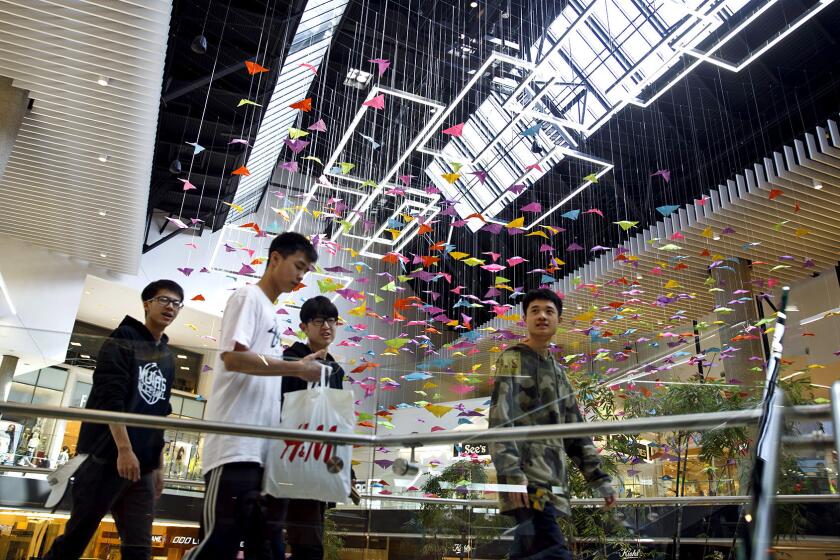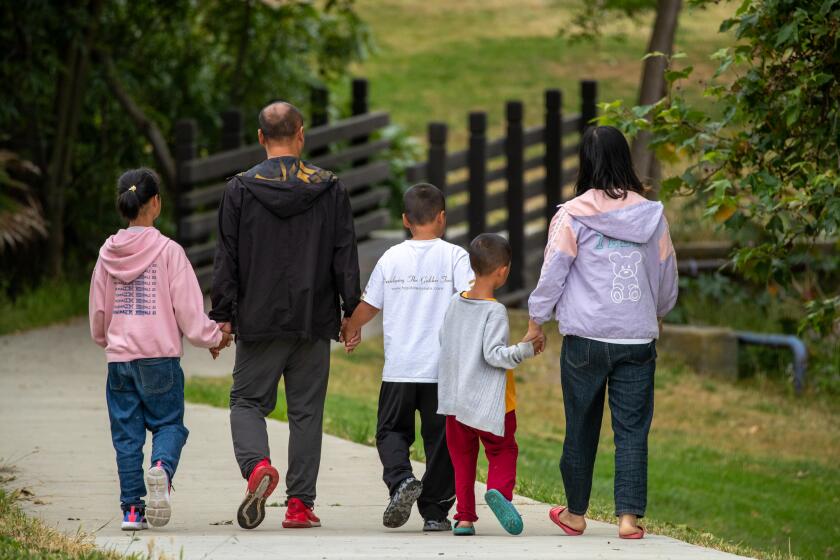In Arcadia and Temple City, Asian American voters fueled gains for Trump

- Share via
After months of waffling, longtime Democrat Edmund Liu swung to Donald Trump because of the smash-and-grab down the street.
When Liu first moved to the U.S. from China, he was drawn to the Democratic Party because he saw it as immigrant-friendly.
But he began to question his allegiance after more than a decade in Arcadia, an affluent suburb at the foot of the San Gabriel Mountains that is home to many Asian immigrants. The tab for celebratory dinners with his extended family often approached four digits, and his paycheck as a software engineer wasn’t stretching as far as before.
Then, about a week before the Nov. 5 election, he saw videos on social media of people in black hoodies running with handbags out of a second-hand luxury store in the Westfield Santa Anita mall while a security guard filmed passively.
“It’s about five minutes driving from my home, and it is like one minute of driving from the Police Department. I was like, ‘That’s ridiculous,’” said Liu, 55. “I was like, ‘OK, I made up my mind, and that’s it.’”

This year in the Arcadia and Temple City areas, which are both majority Asian, Liu’s political shift was common among Asian American voters. Many expressed despair about the direction of the country in the last four years, citing crime, the economy and illegal immigration as reasons to give Trump a chance.
Both areas remained blue, but Trump gained ground from four years ago. In the Arcadia area, Kamala Harris captured 54% of votes this year, after Joe Biden won 60% in 2020. Trump’s share increased from 39% to 43%.
The numbers were similar in the neighboring Temple City area, with Harris getting 53% this year versus Biden’s 60% in 2020.
Arcadia Mayor Michael Cao, who has heard repeatedly from constituents irate about smash-and-grabs, the price of groceries and other problems a part-time suburban politician is ill-equipped to address, expected the move away from the Democratic Party.
When Taiwanese menswear brand SST&C opened its first U.S. store last year, the company bypassed glitzy shopping hubs such as Beverly Hills or South Coast Plaza in favor of a mall tucked into the San Gabriel Valley.
“They felt like no one was listening, and they felt like they just needed a change,” said Cao, who is not registered with a political party and declined to say how he voted.
Asian American voting trends in the Arcadia and Temple City areas mirrored nationwide patterns. According to exit polls, a majority of Asian Americans backed Vice President Harris, but there was a rightward shift. An NBC News poll found that 39% of Asian Americans voted for Trump this year, a five-point increase from 2020.
As with other demographic groups, experts said concerns about inflation, crime and immigration likely fueled the rightward tack among Asian American voters.

James Zarsadiaz, an associate professor of history at the University of San Francisco, said some voters were also likely responding to an uptick in anti-Asian sentiment during the pandemic.
“Republicans have been able to seize on these fears to say, ‘Hey, we are the party of law and order,’” said Zarsadiaz, who is writing a book on Asian American conservatism. “It’s like a perfect storm to have some Asian American voters rethink their loyalties to the Democratic Party.”
Karthick Ramakrishnan, founder of AAPI Data at UC Berkeley’s Asian American Research Center, noted that while Trump gained more support among Asian Americans, that boost could be flimsy, gone by the next election.
“Is this shift a one-off punishment for economic performance — and maybe even issues like crime — or is it a sign of more enduring shifts in opinion?” he said.
With its top-tier school district and mix of recently built mini-mansions and more modest housing stock, Arcadia has long drawn wealthy Asian immigrants, particularly those from China. The main boulevards there and in Temple City are lined with strip malls featuring Asian supermarkets and Chinese regional cuisines.

In the city of Arcadia, which is 57% Asian, voters on Nov. 5 elected a new City Council member, David Fu, making the council all Asian American — possibly a first in California, according to council members.
Councilmember Eileen Wang, the first Chinese American woman on the council, said she was drawn to Arcadia nearly two decades ago because she had heard stellar reviews of the school system and wanted the best education for her two boys.
Wang, who was born in China, has noticed some residents shifting to the right in recent years, spurred, in part, by viral videos like the October smash-and-grab.
“Social media, YouTube, TikTok, everywhere,” she said.
But Wang swung the opposite way. After voting for Republican presidential candidates in the past, she went for Harris this year, impressed by the Democrat’s stance on affordable housing and rental assistance as Arcadia residents battle soaring housing costs.
Statistics from the Arcadia Police Department and the Temple sheriff’s station show that overall crime is up in Arcadia since 2020 but down in Temple City.

Though some voters noted that a president’s influence on crime rates is limited, many said they want a president who talks tough on crime. The influx of migrants crossing the border also hits close to home here, with nearby Monterey Park a major destination for those from China.
Jeff Chang, a 52-year-old insurance broker whose family moved to the U.S. from Taiwan in the 1980s, said the recent smash-and-grabs helped swing his vote.
“When did it become OK?” said Chang, who has lived in Arcadia since 2007. “It shouldn’t be OK.”
Trump's L.A. gains
While Kamala Harris easily carried L.A. County, Donald Trump made significant inroads in a diverse range of communities. The Times went to three places to understand the shift.
This year, Chang voted Republican for the first time. He says he doesn’t always agree with Trump’s statements but thinks he is better equipped to deal with crime and illegal immigration.
Nina Chen, a manager at an Arcadia Chinese restaurant and a one-time Obama voter, said she went for Trump this year, hoping he could deliver a jolt to the economy that would bring back bustling lunch hours.
She sometimes visits nearby strip malls to compare how her restaurant, Tang Gong, is doing.
“The restaurant is very slow, see?” she said, gesturing around the cavernous dining room dotted with a few families eating lunch. “I’ll just wait for next year — waiting for [Trump] to do better.”
Many have recently survived a novel and dangerous journey — flying from China to Ecuador, braving the treacherous rainforest of the Darien Gap on foot, then traversing Mexico by car and bus before crossing the border.
Susan Guo, president of the Arcadia Chinese Assn., moved to the U.S. from China in the mid-1990s and landed in Arcadia because of the school district and the family-friendly environment. She said Trump calling COVID-19 the “Chinese virus” was initially a “big turnoff” for many Chinese residents.

But Guo, who declined to say which candidate she voted for, said the elevation of tech billionaire Elon Musk, who has a massive Tesla manufacturing plant in Shanghai, to Trump’s inner circle helped seal many votes.
“Elon Musk has a big investment in China, and he’s pretty China-friendly,” she said, adding she believed he would be a “good influence” on Trump.
Grace Liu, 60, who runs an international trading company, thinks that Trump, as a successful businessman, is capable of turning the country around, especially with Musk by his side.
“Trump’s ability to solve problems — no one can compare to him,” Liu said in Mandarin.
Liu, who came to the U.S. from Shanghai and has lived in Arcadia for more than 20 years, said she was motivated to vote for the first time because the U.S. has become a “complete mess” in the last four years, from its standing in the world to public safety issues to the border.
“Why did we come to America? The No. 1 thing is freedom,” she said. “If it’s too unsafe, how can you have freedom?”
Suki Xie also voted for the first time, casting her ballot at an Arcadia public library on election day along with her parents, brother and sister-in-law.

All were first-time voters, and all voted for Trump, said Xie, 36, who runs a dried seafood business and is originally from the southern Chinese city of Guangzhou.
Xie is worried about crime, including the smash-and-grab at the Santa Anita mall and break-ins at her friends’ businesses.
“I’ve been in the U.S. for so many years, and until now, I’ve never had this feeling like I’m afraid to leave the house at night,” she said in Mandarin.
Xie said she welcomes more people from China joining the local community, but she has concerns about the migrants who gather at the Fatty Ding strip mall in Monterey Park to look for work, which she said could take jobs from locals and isn’t fair to those who have waited 10 or more years to immigrate legally.
Inflation is also out of control, Xie said, with the price of food, gas and other necessities seeming to suddenly spike.
“We’ve talked with a lot of friends, saying we hope that if we change a president, change a party, let’s see if a new way of governing can change this society,” she said.
Times staff writer Cindy Chang contributed to this report.
More to Read
Sign up for Essential California
The most important California stories and recommendations in your inbox every morning.
You may occasionally receive promotional content from the Los Angeles Times.













